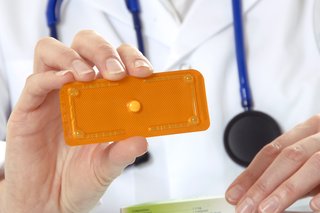
She forgot to take the pill a day or two ago. He didn’t pull out soon enough. The condom failed.
It doesn’t matter how it happened. The potential result is the same. A moment of passion could turn into dirty diapers nine months down the road.
Wondering if those swimmers are going to make it to shore can cause moments of sheer panic. Thankfully, emergency contraception can post the “no trespassing” sign and send them downstream. You just need to use it in a timely manner.
Emergency contraception provides a fairly easy fix for what could otherwise have some pretty drastic consequences. You probably know it can prevent pregnancy. Here are 10 things you might not have known about it.
1. It’s Easy to Get
Getting your hands on emergency contraception is pretty easy. The “morning-after” pill does not require a prescription. Furthermore, anyone can buy emergency contraception regardless of age or gender. This makes it a great, easy-to-access form of birth control for most people.
If you think you’ll be embarrassed by picking it up at the pharmacy, do it discreetly. You can get the over-the-counter version delivered to your door by an online provider. If you prefer the prescription version instead, you can do that online as well, so long as you’re 18 or older.
2. You Don’t Have to Wait for the “Morning After”
It’s true that you have to use emergency contraception within a certain amount of time following unprotected sex. However, you don’t have to wait until the next morning to use the morning-after pill. It’s ability to begin working immediately after sex makes it one of the most convenient options on the market.
Emergency contraception must be used within 72 to 120 hours after sex, depending on the method. As a rule, the sooner you can use it, the better. If that’s right after sex, go ahead and use it and you just might sleep better.
3. Weight Might Affect Effectiveness
Women who weigh more than 165 pounds may want to use emergency contraception other than Plan B or its generics. These morning-after pills, which contain levonorgestrel, have proven less effective than prescription-only pills among heavier women. The copper IUD may also be more effective for some women.
If you have no other option, you should go with a Plan B alternative. If you do, it’s probably smart to use a method that has proven to be more effective among women of a certain weight. You may need to involve a healthcare provider, but the results might be well worth the extra effort.
4. It Doesn’t Abort a Pregnancy
Emergency contraception should not be confused with the abortion pill. It can only prevent fertilization of an egg, not terminate a pregnancy. That’s an important distinction for those opposed to abortion.
The ulipristal acetate in Ella blocks hormones needed for conception and the morning-after pill’s levonorgestrel stops the release of eggs. The copper IUD makes the uterus hostile to sperm, killing them with an inflammatory response. If an egg has already been fertilized by sperm, emergency contraception will neither help nor harm it.
5. Time Is of the Essence
Conception is all about timing, and so is preventing it. Which emergency contraception you use may depend on how long it’s been since you had unprotected sex. Use it too late and you might as well have not used it at all.
You can take the prescription morning-after pill or have a copper IUD inserted within five days of sex. You must use a levonorgestrel pill (the over-the-counter pill) within 72 hours. However, its efficacy begins to wane after only 48 hours. Remember, the sooner the better applies to emergency contraception.
6. You May Need a Plan C
If you have a copper IUD inserted within five days of unprotected sex, you’re good to go. The IUD is a highly effective form of birth control as well as emergency contraception. You can also resume your normal birth control method after taking a morning-after pill.
If you take the prescription version, you must wait until the sixth day before resuming your hormonal birth control method. In the interim, you must either refrain from having sex or use condoms and/or spermicides. In other words, make sure your backup plan has a backup.
7. It Should Not Be Used for Routine Birth Control
With the exception of the copper IUD, emergency contraception should only be used in emergency situations. Relying on morning-after pills as your regular birth control is ill advised, especially since they are only 85% effective. Most routine birth control methods are far more reliable.
If you find yourself using emergency contraception frequently, you may want to change up your birth control routine. There are a lot of options that might be better choices for you on a regular basis.
8. You May Experience Side Effects
Emergency contraception may cause side effects such as abdominal cramps and pain, breast tenderness, fatigue, headaches, nausea, vomiting, and dizziness. They should be minor and last only a few days at most. They certainly won’t last for nine months.
It may also cause your period to start sooner or later than usual or be heavier or lighter as well. You should return to normal with your next cycle.
9. It Doesn’t Cause Serious Complications
Emergency contraception is generally safe. Although some women experience a few temporary side effects, it otherwise causes no serious complications. That can be important down the road.
It doesn’t reduce fertility and it won’t affect your ability to conceive when you’re ready to do so. The hormone in morning-after pills is progestin, not estrogen, in case you’re worried about estrogen side effects. Talk to your doctor before you need to use emergency contraception for advice about the best option for you.
10. It Doesn’t Protect Against STIs
Emergency contraception is designed to protect you from conception. However, it provides zero protection from picking up a sexually transmitted infection (STI). The only thing that can, other than abstinence, is the male or female condom.
Using condoms can significantly reduce your risk of getting an STI, but they aren’t a sure thing. Herpes and HPV can both be transmitted by skin-to-skin contact outside what’s covered by a condom. Condoms that fail not only allow sperm to go where you don’t want them but also disease, including HIV.
Emergency contraception can be a lifesaver when birth control fails or just doesn’t enter your mind during a passionate moment. It’s good to know more about it before you have occasion to use it. Preparing for the possibility while in a state of calm will make the decision easier.
You can always keep a morning-after pill on hand, just in case. You don’t have to wait until you actually need emergency contraception. That way, cooler heads will prevail after things have heated up.
For more informative articles keep visiting Article Ritz.




